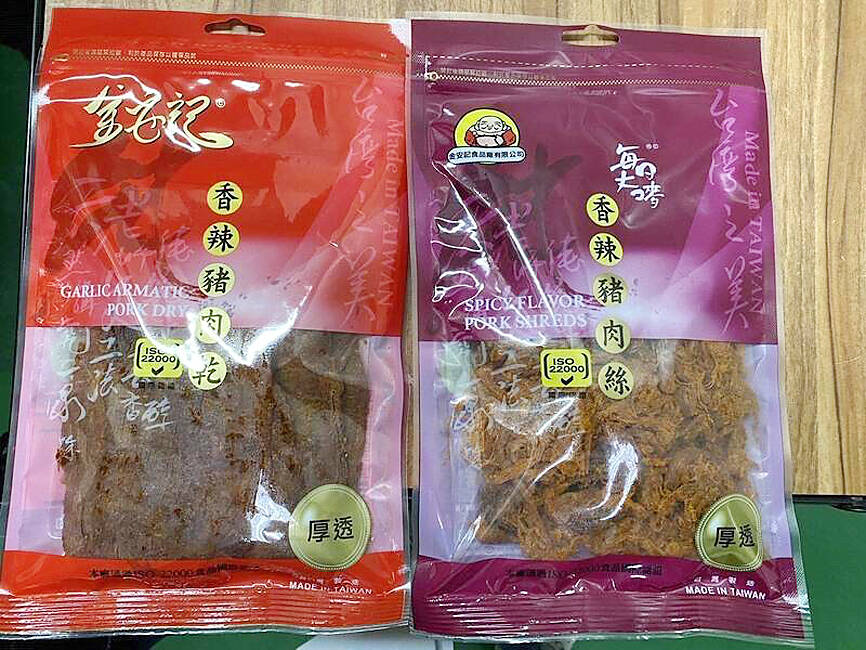A banned industrial dye has been detected in three more batches of chili powder imported from China, the Food and Drug Administration (FDA) said yesterday, adding that affected products had been removed from store shelves as of Friday afternoon.
Earlier this week, food products were found to contain chili powder with the carcinogenic Sudan III dye, imported by Bao Hsin Enterprises Co Ltd (保欣企業) in New Taipei City from Sanhe Drug Co Ltd (三禾藥業) in China’s Henan Province, leading to random inspections that have so far uncovered three more batches containing the dye, the FDA said.
The batches include one inspected by the New Taipei City Department of Health, with an expiration date of Oct. 4, 2026, and two inspected by the Taoyuan Department of Public Health, with expiration dates of Oct. 29, 2026, and Jan. 7, 2027, it said, adding that they were supplied to 10 companies.

Photo courtesy of the Taichung Office of Food and Drug Safety
As of 5pm on Friday, 3,528.3kg of the tainted chili powder and food products containing it had been recalled or removed from store shelves, the agency said.
The Taichung Office of Food and Drug Safety yesterday said that its expanded inspections have found that food company Jinanji (金安記) purchased chili powder from another Bao Hsin batch, with an expiration date of Oct. 12.
Resampling and retesting on Friday confirmed that the chili power contained Sudan III, at concentration level of 20 parts per billion, it said.
Jinanji purchased 325kg of chili powder and used 73kg of it on its “Garlic Armatic Pork Dry” (香辣豬肉乾) product, with expiration dates between Aug. 10 and Feb. 6 next year, and “Spicy Flavor Pork Shreds” (香辣豬肉絲) products, with expiration dates between Aug. 9 and Feb. 5 next year, it said.
The two products weigh a total of 6,739kg and were sold to 15 areas in Taiwan, it said.
Jinanji has informed its 42 downstream clients to recall the food products containing the tainted chili powder, and the unused chili powder has been returned to its supplier in New Taipei City, the office said.
Regarding the differences between the FDA and the Taichung office’s recall numbers, FDA Deputy Director-General Lin Chin-fu (林金富) said that inspections in the consumer market are conducted by local governments, which report back to the FDA, so there is often a one or two-day gap before the agency can include local data.
The FDA has since Dec. 11 last year conducted batch-by-batch border inspections on chili powder imported from China, which are to continue until June 10. It on Wednesday announced that 21 importers or manufacturers that have used the tainted chili power would be suspended from importing chili pepper powder from China for three months.
Additional reporting by CNA

CALL FOR SUPPORT: President William Lai called on lawmakers across party lines to ensure the livelihood of Taiwanese and that national security is protected President William Lai (賴清德) yesterday called for bipartisan support for Taiwan’s investment in self-defense capabilities at the christening and launch of two coast guard vessels at CSBC Corp, Taiwan’s (台灣國際造船) shipyard in Kaohsiung. The Taipei (台北) is the fourth and final ship of the Chiayi-class offshore patrol vessels, and the Siraya (西拉雅) is the Coast Guard Administration’s (CGA) first-ever ocean patrol vessel, the government said. The Taipei is the fourth and final ship of the Chiayi-class offshore patrol vessels with a displacement of about 4,000 tonnes, Lai said. This ship class was ordered as a result of former president Tsai Ing-wen’s (蔡英文) 2018

UKRAINE, NVIDIA: The US leader said the subject of Russia’s war had come up ‘very strongly,’ while Jenson Huang was hoping that the conversation was good Chinese President Xi Jinping (習近平) and US President Donald Trump had differing takes following their meeting in Busan, South Korea, yesterday. Xi said that the two sides should complete follow-up work as soon as possible to deliver tangible results that would provide “peace of mind” to China, the US and the rest of the world, while Trump hailed the “great success” of the talks. The two discussed trade, including a deal to reduce tariffs slapped on China for its role in the fentanyl trade, as well as cooperation in ending the war in Ukraine, among other issues, but they did not mention

HOTEL HIRING: An official said that hoteliers could begin hiring migrant workers next year, but must adhere to a rule requiring a NT$2,000 salary hike for Taiwanese The government is to allow the hospitality industry to recruit mid-level migrant workers for housekeeping and three other lines of work after the Executive Yuan yesterday approved a proposal by the Ministry of Labor. A shortage of workers at hotels and accommodation facilities was discussed at a meeting of the legislature’s Transportation Committee. A 2023 survey conducted by the Tourism Administration found that Taiwan’s lodging industry was short of about 6,600 housekeeping and cleaning workers, the agency said in a report to the committee. The shortage of workers in the industry is being studied, the report said. Hotel and Lodging Division Deputy Director Cheng

‘SECRETS’: While saying China would not attack during his presidency, Donald Trump declined to say how Washington would respond if Beijing were to take military action US President Donald Trump said that China would not take military action against Taiwan while he is president, as the Chinese leaders “know the consequences.” Trump made the statement during an interview on CBS’ 60 Minutes program that aired on Sunday, a few days after his meeting with Chinese President Xi Jinping (習近平) in South Korea. “He [Xi] has openly said, and his people have openly said at meetings, ‘we would never do anything while President Trump is president,’ because they know the consequences,” Trump said in the interview. However, he repeatedly declined to say exactly how Washington would respond in